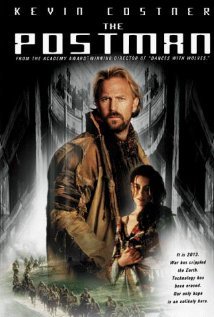“Delivering False News”

| None | Light | Moderate | Heavy | |
|---|---|---|---|---|
| Language | ||||
| Violence | ||||
| Sex | ||||
| Nudity |
What You Need To Know:
Apocalyptic science fiction, THE POSTMAN is an epic movie of unfulfilled potential. In 2013, an actor (Kevin Costner) wanders the wastelands of the United States after most of America has been destroyed by nuclear war. Neo-fascist General Bethlehem, who plunders villages, captures the actor, who escapes and dons a postal uniform as a disguise. At the nearest town, he claims that he is a postman appointed by a restored U.S. government so that he can finagle a bowl of soup. Abby asks him to make her pregnant because her husband is impotent. On his next raid, Bethlehem takes Abby prisoner, and The Postman must come to her rescue. A young admirer of The Postman appoints a rag-tag group of young postmen, and Bethlehem declares war on the postmen.
THE POSTMAN is poorly conceived with continuity problems and spotty acting. Furthermore, this movie is the story of someone who is supposed to be the bearer of hope, but bears only wishful lies. Jesus’s dictum that “the truth will set you free,” which inspired the Founding Fathers, is replaced by the proposition that lies will give you warm, fuzzy encouragement. By replacing truth with lies, the movie demeans the heroic. The movie is further weakened by excessive violence and fornication.
Content:
(Ro, C, AB, LLL, VVV, SSS, NN, A, D, M) Romantic worldview with some Christian allegory; 10 profanities & 20 obscenities; extreme violence including men brutally beaten, men shot as close range, men hacked with sword, women beaten, blood splattering, & battle scenes; graphic adultery & fornication; rear & upper female nudity, alcohol use; smoking & marijuana use; and, lying as part of the plot, some attribution of Christian terms to villain & some positive Christian statements.
More Detail:
Like WATERWORLD, THE POSTMAN is an epic movie of unfulfilled potential. THE POSTMAN is an unabashedly allegorical piece of apocalyptic science fiction. In fact, it could be said that there are two movies now out with the same title: Robert Duvall’s THE APOSTLE, and Kevin Costner’s THE POSTMAN. Both may very well be derived from the ancient Greek word, “apostolos” (messenger), but the message of the two films is very different. Whereas Robert Duvall plays a broken man who delivers the message of the Good News of Jesus Christ, Costner plays a broken man who delivers fabricated messages that are, in fact, merely lies, which offer no more than an ephemeral hope in a post World War III society. Diverging from the humanist connotations and the storyline of the book, the movie is purposefully mythic in Joseph Campbell’s confused sense.
Costner plays a Shakespearean actor wandering the vast wastelands of the western United States in 2013 after a devastating nuclear war which killed most of the people in the U.S. and destroyed the government. Shakespeare, as he comes to be called, is captured by a neo-fascist band, known as “8”, who are attempting to bring dictatorial order to the present-day chaos. Bethlehem (Will Patton), the copier salesman-turned-tyrant, enforces several rules: death to all who cross him; no mercy; and, anyone can fight him to challenge his totalitarian rule. The militia plunder the tiny villages of survivors and abduct the ethnically pure to join their army of 8. Shakespeare is impressed into service after playing a miserable rendition of Shakespeare’s MacBeth in an impoverished village.
Since he shows signs of intelligence (which are not always manifested in his filmmaking,) he is beaten mercilessly. Bethlehem knows that Shakespeare is either a potential threat or a potential right-hand man. Bethlehem spouts Christian terms like redemption and born again as well as fascist terms like ethnic purity. Shakespeare escapes and finds a postal truck in a ravine where he commandeers the uniform of the skeletal postman and becomes: The Postman.
The next walled town, Pineview, won’t let him enter until he fabricates the fib that the U.S. government is being restored, and he is a new official postman. This lie buys him a bowl of soup and the admiration of the town, although the sheriff is skeptical.
Abby (Olivia Williams), a post apocalypse hippie, asks The Postman to make her pregnant because her husband is impotent. When he hesitates, she seduces him in the middle of the night. A black youth, who has renamed himself Ford Lincoln Mercury (Larenz Tate), asks if he can be a postman, and The Postman obliges.
After the sheriff shows The Postman the way out of town, Ford Lincoln Mercury proceeds to make more postmen. Bethlehem arrives with his militia only to be infuriated by the sight of the American flag and people who seem to resist his ruthless reign. Therefore, Bethlehem burns the flag, shoots Abby’s husband and takes Abby prisoner as his concubine. (Of course, we later learn that like any great megalomaniac, he, too, is impotent.)
When Bethlehem’s troops plunder the next village, The Postman rescues Abby, and they escape into the wilderness where they spend some romantic time getting to know each other under very harsh conditions. When they return to civilization, they find that Ford has appointed a plethora of postmen who are delivering mail throughout the region. These bearers of hope and communication reconnect stranded villages of a post-war American society. Bethlehem sees a threat to his reign and declares war on the postmen. Anyone who knows anything about Hollywood epics can predict the ending.
After the critics’ screening, one critic came out and ruthlessly dismissed the movie. He was probably being a little excessive, but it is sad that a movie with so much potential was so poorly conceived. Continuity problems abound in THE POSTMAN ( not the least of which was Abby’s pregnancy, which seemed to progress by fits and starts. Although this movie is pure science fiction, it made the inexcusable mistake of failing to adhere to its own internal logic. Thus, like WATERWORLD, time and space seem to be confused.
The acting, too, was spotty. While Will Patton plays a superb villain, Costner never seemed to find himself either as a messenger of hope or as a hero, and Abby jumped from being from a tough, feminist hippie to being a doe-eyed wife.
However, the real problem with THE POSTMAN is that this is a story of someone who should be delivering good news. He is a bearer of hope, but the hope he delivers is merely his makeshift lies. Therefore the American vision based on the premise enunciated by Jesus Christ in John 8:32 that “the truth will set you free” is replaced in the movie by the groggy American dream that mythic lies will give you some warm, fuzzy encouragement. By replacing truth with lies, the movie demeans the heroic, and it is hard to imagine that this post apocalyptic society will be much better than the pre- World War III America (which, by the way, was also corrupted by the lies of their postmen, the mass messengers of the entertainment industry).
Thus, two 1997 Christian movies with similar titles stand in stark contrast. THE APOSTLE bears witness to the Gospel: THE POSTMAN traffics in myth that turns out to be mere figments of one man’s imagination as he seeks to survive in a chaotic world.


 - Content:
- Content: 




